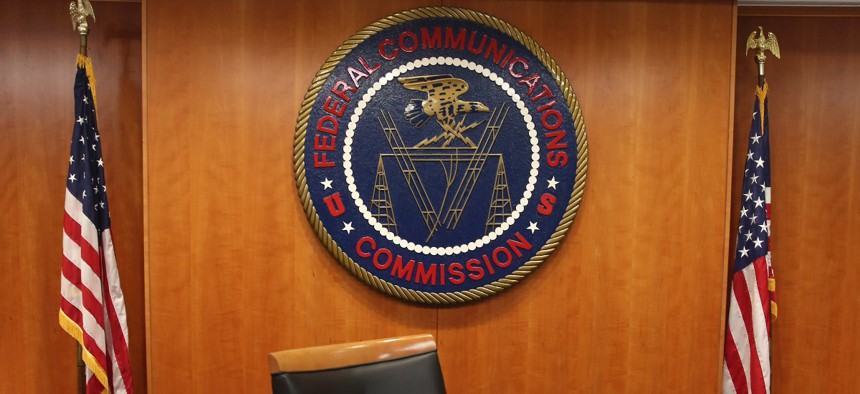FCC will launch new space bureau

Mark Wilson/Getty Images
The new bureau will help the agency better perform its existing responsibilities and tackle increasing commercial interest in space.
Federal Communications Chairwoman Jessica Rosenworcel announced that the agency will be launching a new space bureau at an event held by the Satellite Industry Association on Thursday.
The new space office will come out of a reorganization of the agency’s International Bureau “to better manage marketplace realities,” according to Rosenworcel. Specifically, the reorganization will result in the new Space Bureau and a new standalone Office of International Affairs.
“This reorganization is to help ensure that both the new Space Bureau and the Office of International Affairs stay relevant, efficient and effective over time, and that is what this effort is all about,” Rosenworcel said.
The chairwoman noted that the agency has not kept up with the 21st century and could use some reorganization to best address issues and changes it is seeing—such as keeping up with the growing number of satellite applications—while helping the United States lead in space. She added that the FCC currently has applications for 64,000 new satellites, and last year the agency saw an eightfold increase in applications for fixed satellite service gateway earth stations—which deliver data between satellite and terrestrial systems—while receiving applications for new space ventures like lunar landers. Such application increases align with private companies’ investment of $10 billion in space in the last year.
“The new space age has turned everything we know about how to deliver critical space-based services on its head,” Rosenworcel said. “The way constellations are designed, satellites are manufactured, launches are organized, and even how systems are upgraded or replaced, are all being redesigned and reimagined. But the organizational structures at the agency have not kept pace as the applications and proceedings before us have multiplied, and in some cases exponentially. And you can’t just keep doing things the old way and expect to lead in the new.”
Rosenworcel noted that it will be important for the FCC to coordinate and collaborate with other agencies like NASA and the National Oceanic and Atmospheric Administration, as part of the agency’s space efforts. She pointed to initiatives the agency has already undertaken, such as updating rules, speeding up the licensing process and increasing spectrum availability, as well as working to reduce orbital debris. These new changes are designed to help the FCC perform its current duties better, according to the chairwoman.
“This reimagined Bureau will support the United States leadership and the emerging space economy, promote long term technical capacity to address satellite policies and improve our coordination with other agencies on these issues,” Rosenworcel said. “The changes I’m announcing today are not about taking on new responsibilities at the FCC. They are about performing our existing statutory responsibilities better and freeing up resources to help focus on our mission.”
The chairwoman did not say when this reorganization would take effect.
Panelists at the event expressed their excitement at the news.
“The formation of a dedicated Space Bureau within the FCC is a positive step for satellite operators and customers across the United States,” Julie Zoller, head of global regulatory affairs for Project Kuiper at Amazon, said. “The industry is experiencing tremendous growth with rapid investment, and we appreciate Chairwoman Rosenworcel’s efforts to support a robust and innovative space industry. I am confident the decisions announced today will accelerate U.S. leadership in satellite technology and services.”
“This will make the FCC an even stronger partner in the domestic and international environment,” Jennifer Warren, vice president of civil and regulatory affairs at Lockheed Martin, said. “It’s a really strong signal internationally, that the FCC, in partnership with the other agencies, is looking to enable U.S. leadership across the space domain…and so having these enabling regulatory frameworks domestically and internationally will be critical. And I think this sends the signal that we can get better because the U.S. is gonna help drive that.”
The panelists highlighted the importance of the FCC having a dedicated team with expertise in space as critical for the agency and the U.S. to lead in space.
Umair Javed, who serves as Chairwoman Rosenworcel’s Chief Counsel, added that the agency is looking to work with industry for this endeavor.
“For this industry and for this economy, for it to continue to succeed, and to grow and to scale, the FCC has to grow with it,” Javed said. “We want to work very closely with the industry, and this is about matching the innovation [of industry]. So I think if we’re going to be successful, we’ve got to understand clearly where you guys are headed directionally, what’s important, so that we can prioritize, as well. And so I think that is hopefully the start of close cooperation between the FCC and industry, and [we are] looking forward to working together on this effort.”
NEXT STORY: Bid protests decline for fourth consecutive year






